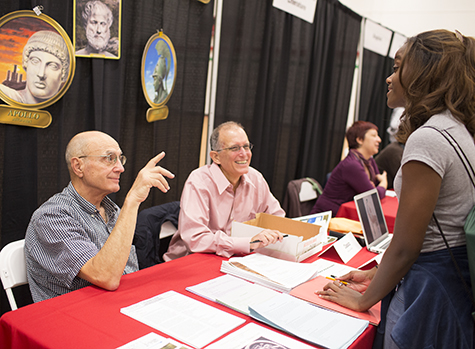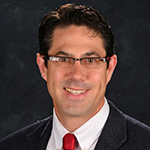
Matthew DeVoll, PhD, assistant dean in the College of Arts & Sciences at Washington University in St. Louis, rejects the term “sophomore slump.”
“Slump implies things have gone wrong,” said DeVoll, who is dean of sophomores. “Rather, I think sophomore year is a time of wondering. It’s natural to wonder if you’re making the right choices and to test those choices.”
The Major-Minor Fair, which takes place from 3:30-5:30 p.m. Monday, Oct. 6 on the lower level of the Mallinckrodt Center, will offer freshmen and sophomores the opportunity to explore those choices. DeVoll talks about the unique challenges of sophomore year and the biggest mistakes sophomores make when selecting a major:
Why are the first 60 days of the sophomore year so pivotal?

Why are Arts & Sciences students encouraged to wait to declare their major?
Because we don’t ask students to declare early, you don’t see a lot of changing of majors here. I think that’s a much healthier emotional experience because it’s not about trying to disprove your initial choice; it’s about deciding which among these options is right for you.
At Washington University, finding your academic home can mean getting a minor or second major across schools. That’s possible because of the culture here. Like St. Louis, we are a large small place, so advisers know each other personally and we have wise deans who create opportunities for us to meet and work with each other.
What should students expect from the Major-Minor Fair?
There are three things students need to know before declaring a major: “What are my strengths and interests?” “What are my options?” and “What’s the right fit?” This is an opportunity to look at the second and third points. For instance, if a student comes into Wash U and says, ‘I want to study neuroscience,’ well ,you could do it through biology, which is a natural science, psychology which is a social science or PNP (philosophy–neuroscience–psychology), which is more humanities focused. At the major-minor fair, they can go to all three tables and see what the majors are like, and meet some of the faculty members who will become their advisers and mentors. Getting that feel for the size and personality of a department is really important when it comes to fit.
What is the biggest misconception students have about picking a major?
Probably the misconception is how a college degree relates to a career. You can’t put too much weight on the academics alone. It really requires a combination of academics and experience which can come through internships, study abroad, research, student groups. That’s why so many of our campus partners, such as the Career Center, Washington University Libraries, the Skandalaris Center, Office of Overseas Programs and many more, will be at the fair. Students will sometimes shy away from a particular field of study because they don’t see how it can lead to a career, but it’s important for them to remember they are making two choices: “What is my academic major?” and “What career do I want to pursue?” They are related, but they are separate choices.

Do you get annoyed by the steady stream of reports identifying the wealthiest majors?
Majors don’t get jobs, people get jobs. No major is a dead end and every major can lead to a career. Those articles assume the only job worth looking at is the first job out of school. In fact, that’s not a productive way to look at lifetime wealth. Liberal arts students in a lifetime make as much as most other students when they also receive graduate training. The studies also beg the question of “What is the purpose of a college degree?” I remind students they are preparing for more than a career. They are preparing for a life.